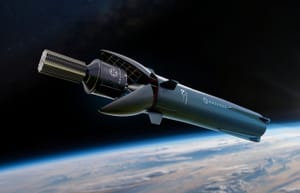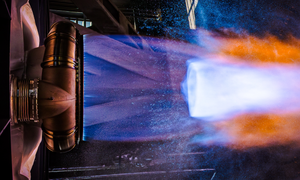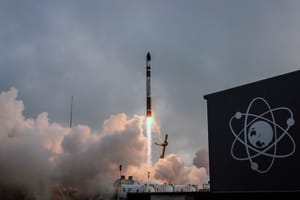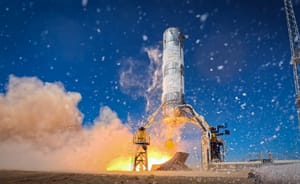
Nov 13, 2024
Rocket Lab shares update on Neutron development, Mars sample mission bid
Rocket Lab held its fiscal year 2024 third-quarter financial results update and conference call on November 12th. During the call, the company shared progress updates on the partially reusable Neutron rocket, its bid for the U.S. Mars Sample Return mission, Electron missions, and the company's outlook for the near future.
Neutron was a major focus of Rocket Lab's presentation with the company quickly mentioning that the launch vehicle has already had two launches booked for a commercial constellation, at Rocket Lab's targeted price. The company believes that Neutron may possibly launch the entire constellation, the constellations operator was not mentioned in the presentation. Rocket Lab also expects Neutron to be positioned well for the on-ramp to the U.S. Space Force’s National Security Space Launch Lane 1 program, due to company experience with Electron.
Hardware progress for Neutron has been actively underway ahead of a maiden launch in 2025. Second-stage testing recently culminated in a wet dress rehearsal of the stage in a flight configuration with avionics, fluids, and propellant management systems present. Progress on the first-stage is close behind as teams have recently passed manufacturing milestones ahead of testing similar to what the second-stage recently passed. Neutron's fairings have also completed assembly and integration ahead of its testing campaign. The two halves will remain attached to the first-stage and protect the second-stage and payload during ascent, ahead of opening to allow the second-stage to reach orbit.

Testing of the Archimedes engine is stated as being in full swing with multiple engines participating in firing tests and refurbishment between tests. Rocket Lab believes that the engine is proving its durability and design while reaching performance expectations. Engine testing is said to have doubled along with an increased production rate, figures were not given.

Construction for Neutron's launch pad at Launch Complex 3, at the Mid-Atlantic Regional Spaceport in Virginia, is well underway with fabrication of the launch mount currently ongoing along with testing of launch vehicle hold-down mechanisms. Recent weeks have had ground-side propellant tanks installed and concrete poured for the vehicle's flame trench. Installation of Neutron's launch mount in Virginia is expected soon. The assembly, integration, and test facility three miles from the launch pad has also completed construction ahead of delivery of the first flight vehicle next year.
Another major key point of Rocket Lab's presentation was the company's proposal for NASA's Mars Sample Return mission, having been selected back in October as a potential choice. Rocket Lab believes they already possess the expertise to return NASA's Mars samples due to delivering the two ESCAPADE Mars orbit spacecraft, having designed a spacecraft that returned to Earth from orbit, supporting proximity operations for Astroscale and U.S. Space Force missions, along with being an industry leader in mission software and routine small satellite launch. Due to company acquisitions Rocket Lab's teams have already worked on the Insight Lander, Perseverance Rover, Ingenuity Helicopter, the Mars Atmosphere and Volatile EvolutioN mission, and the Mars Science Laboratory Cruise Stage.
With all this expertise Rocket Lab is confident in their chances to win the Mars Sample Return contract. NASA is expected to decide on the contract later this year.

Electron has remained the workhorse of Rocket Lab's launch operations, with it becoming the third most launched rocket in 2024 so far with 12 launches. The two rockets ahead of it are SpaceX's Falcon 9 with 105 launches and China Academy of Launch Vehicle Technology's Long March 2 series with 14 launches, as of November 5th. Quarter three had three Electron missions occur for Synspective, Capella Space, and Kinéis, all repeat customers.
Highlighted in the presentation, Electron's most recent mission had Rocket Lab sign a contract with a currently unnamed customer, rumored to be E-Space, ten weeks before launch, demonstrating a real-world rapid turnaround. Rocket Lab believes it is the only small launch provider capable of a rapid turnaround service due to its mass production of Electron, reliable capabilities, and team experience. The U.S. military is reportedly highly interested in this capability.
Currently, Rocket Lab has a 1.048 billion United States Dollar backlog on orders for launches and space systems. Launches make up 326.4 million of the backlog with space systems making up the other 721.2 million. Rocket Lab believes they can clear half of the backlog within 12 months and the rest afterward. This over billion-dollar backlog was an eighty percent year-on-year increase, largely driven by the U.S. Space Development Agency and Electron launch bookings, according to the company.
In the next quarter of fiscal year 2024, Rocket Lab is expecting to increase its launch cadence for Electron along with growing its space systems revenue. Next fiscal year the company is planning to begin flying Neutron too.
Who is Rocket Lab?
Rocket Lab is an American spaceflight company founded in June 2006 and headquartered in Long Beach, California. Rocket Lab currently operates the Electron small satellite launch vehicle and is developing the partially reusable medium-lift Neutron launch vehicle. The company also owns a number of other spaceflight companies to provide an end-to-end solution from mission planning to launch.



